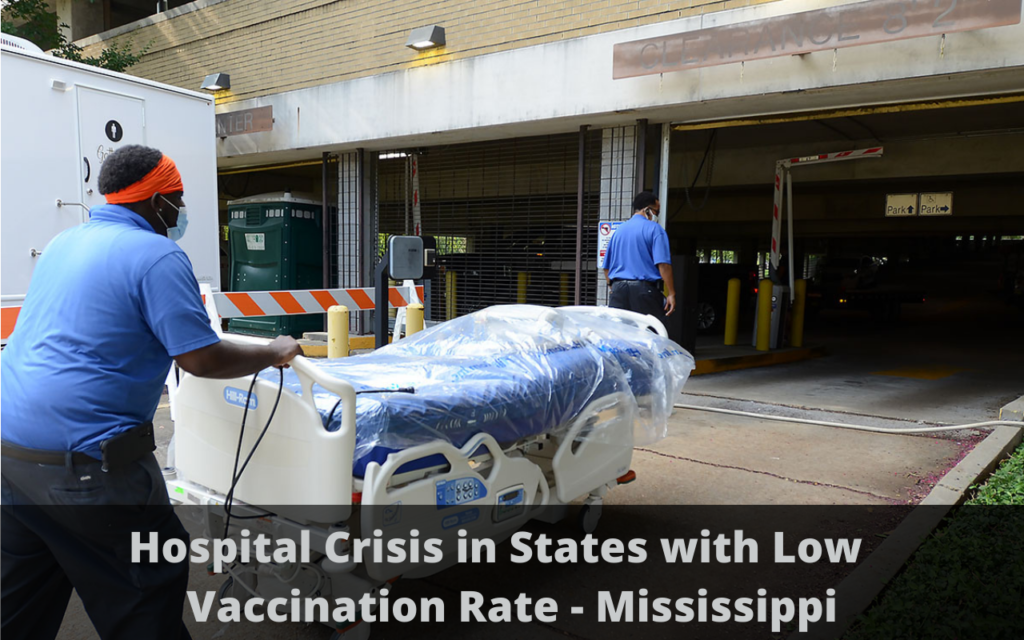The COVID-19 pandemic has brought various difficult issues to address all over the world. In the United States, hospitals are overcrowded with patients suffering from COVID-19 because of the highly contagious Delta variant.
Hospitals all over Mississippi declared that they are still in crisis Monday – not from the aftermath of Hurricane Ida but because of the continued influx of COVID-19 patients. This can be attributed to the fact that the state has one of the lowest vaccination rates in the country. Doctors and nurses in the state have already been used to the rampant denial and misinformation about COVID-19.
The crisis can be attributed to the state’s low vaccination rate, with about 38% out of the state’s 3 million people fully vaccinated against COVID-19.
“There’s no point in being judgmental in that situation. There’s no point in telling them, ‘You should have gotten the vaccine or you wouldn’t be here,’” said Dr. Risa Moriarity, executive vice-chair of the University of Mississippi Medical Center’s emergency department. “We don’t do that. We try not to preach and lecture them. Some of them are so sick they can barely even speak to us.”
Recommended Read: Moderna Vaccine: Is the Booster Shot Ready for Rollout?
Hospital staff at the University of Mississippi Medical Center, the only level one trauma center in all of Mississippi, are caring for the sickest patients in the state.
COVID-19 Patients overwhelm Hospitals Despite Hurricane Ida
Despite massive power outages across the state as the historic storm ripped through, several Mississippi hospitals reported having little to no disruption of care because of the severe weather. One hospital in Pike County lost power for several hours, but generators kept the storm from affecting patients.
Still, intensive care units across Mississippi remain at or near capacity as hospitals manage staff shortages and high numbers of COVID-19 patients. Doctors, nurses, and hospital staff continue to pull long shifts to manage the ongoing stress of a health care system that doesn’t have enough workers.
“In south Mississippi and throughout the state, we are in crisis,” said April LaFontaine, Gulfport Memorial Hospital’s chief administrative officer. “Our hospital was full before the hurricane, and we’re still full now.”
According to state health officer Dr. Thomas Dobbs, in one hospital in Mississippi, four pregnant women died last week with 3 cases requiring emergency C-sections, and babies were born severely premature.
Recommended Read: 61% of Californians Support Vaccine Requirements, Poll Shows.
“This is the reality that we’re looking at and, again, none of these individuals were vaccinated,” Dobbs said.
Ida severely damaged southern Louisiana, leaving all of New Orleans without power. Mississippi hospitals say they’ve been more fortunate with little disruption, even as more than 75,000 Mississippians remained without power by Monday at 5 p.m.
Vaccine and testing clinics have been closed across the state, with many planning to resume care Tuesday. Emergency rooms remained open Sunday and Monday, even when the worst of Ida downed power lines and flooded roadways.
During a recent news conference, UMMC’s head, Dr. LouAnn Woodward, described the toll of the low vaccination rate on health care workers.
“We as a state, as a collective, have failed to respond in a unified way to a common threat,” Woodward said.
Recommended Read: California: Democrats Drop Statewide Vaccine Mandate Proposal.
The total count of coronavirus hospitalizations in Mississippi has dipped slightly, with just under 1,450 people hospitalized for coronavirus on Sept. 1, compared with around 1,670 on Aug. 19. But they are still higher than numbers during previous surges of the virus.
In the medical center’s children’s hospital, emergency room nurse Anne Sinclair said she is tired of the constant misinformation she hears, namely that children can’t get very ill from COVID.
“I’ve seen children die in my unit of COVID, complications of COVID, and that’s just not something you can ever forget,” she said.
“It’s very sobering,” continued Sinclair, who is the parent of a 2-year-old and a 5-year-old and worries for their safety. “I just wish people could look past the politics and think about their families and their children.”

